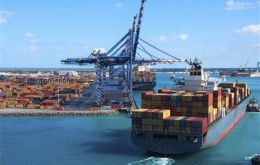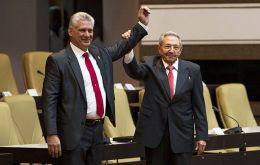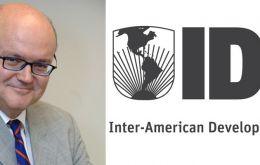MercoPress. South Atlantic News Agency
Tag: Latin America and Caribbean
-
Wednesday, January 18th 2023 - 10:46 UTC
Latin American exports lose momentum in 2022 and 2023, report by IDB Bank

Latin America and the Caribbean value of goods exported during 2022 rose at an estimated 18.8% rate, which represents a downward trend in the region's commerce figures of some 27,8% when comparing 2021 with 2022, according to a report from the Inter American Development Bank, IDB.
-
Wednesday, April 15th 2020 - 13:14 UTC
As demand from China and G7 members plunges, LAC faces sharp decline in growth, World Bank report

The Latin America and Caribbean (LAC) region is seeing a sharp decline in growth due to the COVID-19 (coronavirus) crisis, which requires several policy responses to support the most vulnerable, avert a financial crisis, and protect jobs, according to a new report from the World Bank.
-
Saturday, November 30th 2019 - 07:53 UTC
Lower trade barriers helped faster economic and wage growth in Latin America, IDB report

Latin America and Caribbean region saw faster economic and wage growth thanks to a lowering of trade barriers, a new report by the Inter-American Development Bank shows. The study also provides policy recommendations to ensure the region is better positioned to take advantage of trade liberalization and make its benefits more tangible to citizens.
-
Tuesday, April 9th 2019 - 06:02 UTC
Baroness Fairhead visits Argentina and Brazil to bolster trade and investment relations

Minister of State for Trade and Export Promotion Baroness Fairhead, is travelling to Brazil after visiting Argentina this week to meet with key Brazilian and Argentine businesses and government ministers to discuss the UK’s commitment to trade and investment in both countries and the wider Latin American and Caribbean (LATAC) region.
-
Thursday, April 19th 2018 - 22:24 UTC
Miguel Díaz-Canel becomes the new president of Cuba: there is no chance of a Trojan horse

Miguel Díaz-Canel has been ratified on Thursday by the National Assembly of Cuba as the new president of the Council of State, the country's first leader in practice. The parliament ratified the former vice president with 99.83% of the votes of the deputies present. Diaz-Canel replaces the General Raúl Castro, who retires from power after 12 years at the head of the country. However, the new president clarified that Raúl Castro “will lead the most important decisions” for the country.
-
Friday, April 6th 2018 - 19:47 UTC
Regaining citizens’ trust in public institutions is key to resuming inclusive growth and well-being in Latin America and the Caribbean

Brussels, 09 April 2018 - Three out of four Latin Americans today show little or no confidence in their national governments. Around 80% think corruption is widespread. These levels are both up from 55% and 67% respectively in 2010. Mistrust is rising as in most regions of the world and risks deepening the disconnect between people and public institutions, harming social cohesion and weakening the social contract. Reconnecting public institutions with citizens by better responding to their demands is thus critical for strengthening growth and sustainable development in Latin America and the Caribbean (LAC) and for the well-being of the region’s citizens, according to the Latin American Economic Outlook 2018, Rethinking Institutions for Development. The region needs more transparent, capable, credible and innovative institutions if it wants to put itself on a higher and more inclusive development trajectory.
-
Wednesday, November 8th 2017 - 21:02 UTC
Latin America's exports expected to increase 10%, following four years of declining prices

In 2017 Latin America and the Caribbean will have left behind half a decade of prices decline of its export basket plus a weak increase in the exported volume, achieving an overall 10% growth in the value of its shipments abroad, according to new estimates released by ECLAC in Chile.
-
Wednesday, May 13th 2015 - 08:21 UTC
Latam to debate controversial issue: 'post Washington Consensus' industrial policies

The Inter American Development Bank, IDB, has organized a seminar to discuss industrial policies in Latin America and the Caribbean in a post Washington-Consensus framework. Anemic economic growth in the region is in need of policy shot in the arm.
-
Wednesday, May 13th 2015 - 08:14 UTC
Remittances to Latin America and Caribbean beat the 2008 pre-crisis record

Remittances to Latin America and the Caribbean set a new record high in 2014 with 65bn dollars basically supported by the recovery of the economy and labor market in the United States, according to the latest release from the Inter American Development Bank.
-
Wednesday, April 22nd 2015 - 06:03 UTC
Understanding the drivers of prosperity in Latin America and the Caribbean

A new World Bank Group report, “Shared Prosperity and Poverty Eradication in Latin America and the Caribbean”, explores the performance of eight countries to understand what has driven progress, and what it will take to sustain it.
